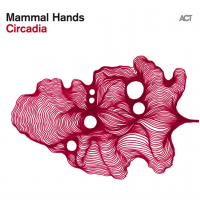Home » Jazz Articles » Album Review » Winnipeg Jazz Orchestra: Voices: A Musical Heritage
Winnipeg Jazz Orchestra: Voices: A Musical Heritage
As with any album based on enduring themes, it is best to separate purpose from result and appraise the music on it own merits. In that respect, the WJO performs brilliantly, with no nuance or accent overlooked or undervalued. In other words, the ensemble is fully invested in the enterprise from the outset and plays with awareness and passion. Unison passages—even the most demanding—are easily mastered, while soloists are ready and able to add contrast and color when needed. Soloists' names are not given, which is the album's lone miscue.
As for the music, it spans the gamut from singular to swing, always with an impressive discernment of its own. The session opens on a Ukrainian motif with "Keeyn," the first movement of John Stetch's three-part Parallel Steppes suite, based on the Ukrainian folk song "Chorni Ochka Yak Teren," whose contrapuntal and chorale-like formats lead to the enchanting "Ochka," based on a second folk theme, and the dynamic up-tempo "Yaseni" (or Yaseny), whose sax soli, virtuosic piano discourses and hopak and kolomiyka rhythms bring the suite to a close.
Rodrigo Munoz' "Homenaje," which uses delightful Latin rhythms including the Chilean cueca to make its point, was written as an homage to the important Latin American musician and activist Victor Jara, Jeff Presslaff's "The Living Mind" as a paean to the pentatonic scale, developed in ancient civilizations and still used in various musical settings to this day. Henry Onwuchekwa composed and Richard Gillis arranged the colorful and light-hearted "Oriri," which means "party" in Onwuchekwa's hometown in Nigeria, a marked contrast to the austere landscape painted in Gillis' Icelandic "Shadows," which follows.
The orchestra nails each one, as it does Marco Castillo's luminous salute to the Amazon rain forest, "Choro para Amazonia"; Andrew Balfour's tantalizing bow to the Ojibway culture, "Ishpiming"; and Michelle Gregoire's ardent "Bison Hunt," the album's closest brush with mainstream contemporary jazz. But jazz isn't the essential point here; reverence is. The WJO is honoring Manitoba's vast musical narrative and doing so as tastefully and proficiently as it can. Mission accomplished. And if you'd like to sample another superb album in the same vein, check out the Saskatchewan All-Star Big Band's Sasketchewan Suite (Chronograph Records 094).
Track Listing
The Parallel Steppes; Keeyn; Ochka; Yaseni; Homenaje; The Living mind; Oriri; Shadows; Choro para Amazonia; Ishpiming; The Bison Hunt.
Personnel
Winnipeg Jazz Orchestra
band / ensemble / orchestraNeil Watson
saxophoneSean Irvine
saxophoneConnor Derraugh
saxophonePaul Balcain
saxophoneNiall Cade
saxophoneMonica Jones
saxophoneLauren Teterenko
saxophoneKyle Wedlake
saxophoneShane Hicks
trumpetAndrew Littleford
trumpetMatthew Walden
trumpetRichard Gillis
trumpetJoel Green
tromboneFrancois Godere
tromboneJeffrey Acosta
tromboneJeff Presslaff
tromboneIsabelle Lavoie
trombone, bassWill Bonness
pianoLarry Roy
guitarAdditional Instrumentation
Gilles Fournier: Bass; Karl Kohut: Bass; Fabio Ragnelli: Drums; Victoria Sparks: Percussion; Marco Castillo: Guitar; Henry Onwuchekwa: Bass, percussion, guitar; Rodrigo Munoz: Congas, Cajon.
Album information
Title: Voices: A Musical Heritage | Year Released: 2022 | Record Label: Self Produced
Tags
About Winnipeg Jazz Orchestra
Instrument: Band / ensemble / orchestra
PREVIOUS / NEXT
Support All About Jazz
 All About Jazz has been a pillar of jazz since 1995, championing it as an art form and, more importantly, supporting the musicians who make it. Our enduring commitment has made "AAJ" one of the most culturally important websites of its kind, read by hundreds of thousands of fans, musicians and industry figures every month.
All About Jazz has been a pillar of jazz since 1995, championing it as an art form and, more importantly, supporting the musicians who make it. Our enduring commitment has made "AAJ" one of the most culturally important websites of its kind, read by hundreds of thousands of fans, musicians and industry figures every month.

























